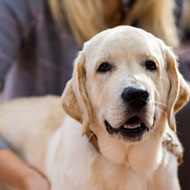
Guidance hopes to dispel myths and ensure safety
The Royal College of Nursing has published the first ever protocol to help hospitals and other health services to bring therapy animals into care settings.
A survey last year found that while the majority of nurses think animals are hugely beneficial to patients, most of their workplaces did not allow animals.
It is hoped that the new, evidence-based protocol will dispel myths about the dangers of animals in health care settings and encourage all health services to consider if animals can aid their patients.
The guidance promises to help services to ensure the safety of patients, health care staff, animals and their owners, whilst allowing patients to reap the benefits that animals can bring.
In the recent survey, nine in 10 nurses said they felt animals can improve the health of patients with depression and other mental health problems, while 60 per cent believed that animals can help speed patient recovery.
“Anyone who’s worked in this area can see the amazing impact animals have on the health of adults and children alike,” said Amanda Cheesley, RCN professional lead for long-term conditions and end-of-life care.
“However there are so many myths around the dangers of having animals in health care settings that most organisations are too concerned to try it out.
“This protocol will help to dispel these fears by supporting hospitals to include animals in the care they deliver in a safe and professional way. We hope that it will encourage all health services to consider how animals can help their patients and help us to remove the taboo from what is a really remarkable area of care.”



 The Veterinary Medicines Directorate (VMD) is inviting applications from veterinary students to attend a one-week extramural studies (EMS) placement in July 2026.
The Veterinary Medicines Directorate (VMD) is inviting applications from veterinary students to attend a one-week extramural studies (EMS) placement in July 2026.